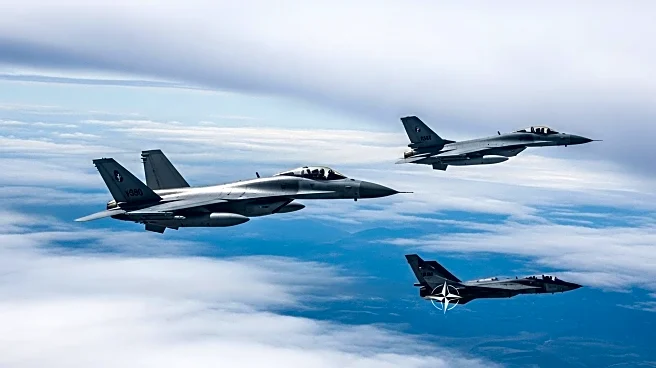What's Happening?
Russian fighter jets violated Estonian airspace, ignoring signals from NATO pilots during a 12-minute incursion. The incident involved Russian MIG-31 fighters entering Estonian territory near Vaindloo Island in the Baltic Sea. Estonian officials confirmed the violation through radar and visual contact, dismissing Russia's denial of the incursion. The jets were tracked by Finnish and Italian fighter jets, which escorted them back to international airspace. Estonia's foreign minister labeled the event a serious violation of NATO airspace, marking the fourth such breach by Russia this year. President Trump expressed concern over the incident, indicating potential trouble but awaiting further briefings.
Why It's Important?
The violation of Estonian airspace by Russian jets underscores ongoing tensions between NATO and Russia, highlighting the strategic importance of the Baltic region. Such incidents test NATO's readiness and response capabilities, potentially straining diplomatic relations and military resources. Estonia's call for consultations under NATO's Article 4 reflects the seriousness of the threat to its territorial integrity and security. The repeated airspace breaches may be part of a broader strategy by Russia to divert Western attention from Ukraine, posing challenges to NATO's collective defense and strategic priorities.
What's Next?
Estonia plans to request consultations under NATO's Article 4, which could lead to increased military presence and defensive measures in the region. NATO members may consider bolstering air defense systems and conducting joint exercises to deter further violations. The incident may prompt discussions on the alliance's response strategies, including potential military actions if such breaches continue. Diplomatic efforts to address the situation and prevent escalation are likely to intensify, with NATO seeking to balance deterrence and dialogue with Russia.
Beyond the Headlines
The airspace violation raises questions about Russia's intentions and the potential for hybrid warfare tactics, including cyberattacks and influence operations. The incident may influence NATO's strategic focus, potentially shifting resources from supporting Ukraine to reinforcing defenses in member states. The situation highlights the delicate balance between military readiness and diplomatic engagement in maintaining regional stability and preventing conflict.










